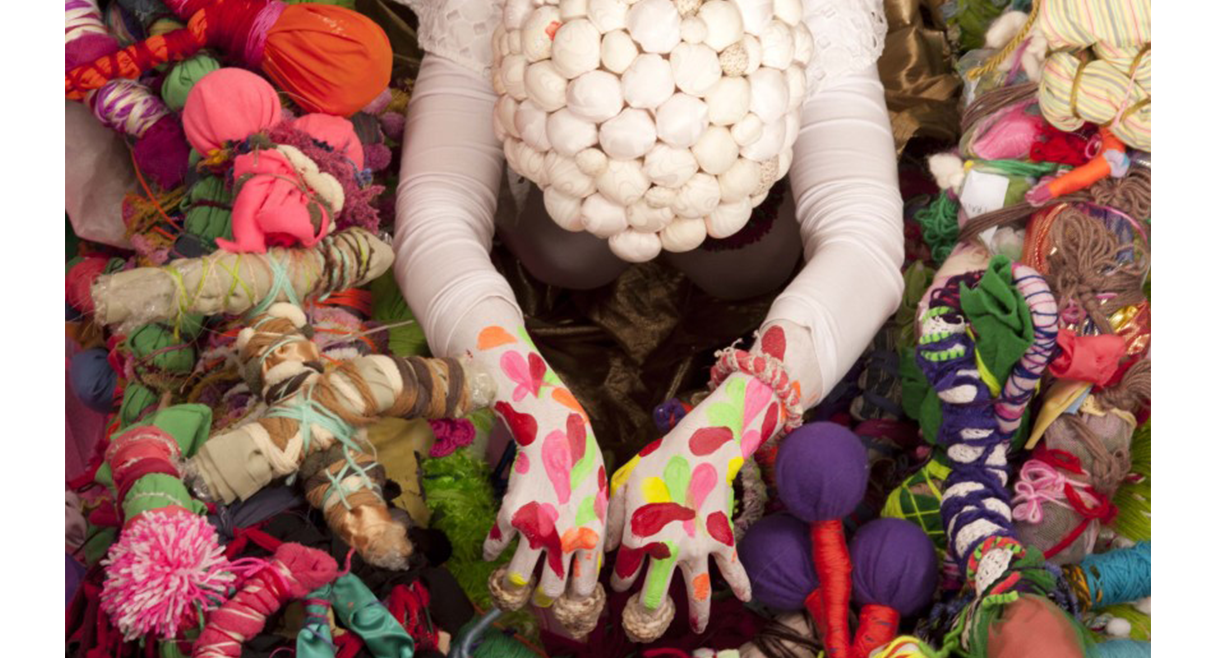FREE EVENT
Level 2, Building 100
RMIT University
Entry to Design Hub Gallery via the Victoria Street forecourt.
TIMES
Tuesday to Friday: 11am – 5pm
Saturday: 12.30pm – 5pm
Sunday: Closed
Monday: Closed
The Children’s Sensorium is an interactive exhibition featuring light, colour, touch, sound, smell and taste to activate children’s curiosity, connect them to local Kulin country, and introduce strategies and techniques that support emotional resilience and wellbeing.
With artistic direction from Boonwurrung elder N’Arweet Carolyn Briggs, this exhibition draws on themes of nature, working with the Kulin calendar and featuring the transition from Guling or orchard season (August) to Poorneetor tadpole season (September/October). The exhibition is designed for children aged 4-11 and includes sense-based installations that draw on touch, sound, vision, smell and taste to create an environment that is fun, engaging and activates children’s curiosity while connecting them to strategies and techniques that support resilience and wellbeing. It will include a variety of materials for play, and will be a space in which children can spend time to explore their senses, feelings, thoughts, worries and hopes.
This project will be included in the Archives of Feeling exhibition at RMIT Design Hub Gallery.
Public Program
Designed for children aged between 4 – 11 years.
Gallery Gardening
Children gain gardening knowledge by investigating familiar edible and ornamental plants, observing their structure using microscopes and magnifying glasses. They will learn the propagating process to replicate at home or school.
Miniature Worlds
Guided by Heather, children look closely at plants and respond with observational, imaginary drawing as they get creative exploring the micro-structures of plants using magnifying glasses and microscopes.
Connecting to Country
Children discover how to connect to and build knowledge of the Country we are on and its contributions to wellbeing. Exploring Country through cultural practices, dance, food and language.
Exploring Senses
Children are introduced to simple mindfulness, sensory awareness and play-based activities aiming to equip them with tools and techniques they can use independently to manage intense emotions.
Move, Sound, Touch, Play
Live Particle use carefully selected sensory objects and tools as entry points into embodied play: moving, vocalising, imagining, mindful touch and tactile resistance. The strategies are experiential, often non-verbal and provide creative strategies to manage physical and mental wellbeing.
The Future of Play
Children learn the power of play as a core literacy. Circulating between a series of play stations, children discover play based learning to regulate emotions.
Movement, Meditation and Dance
Using playful, mindful movement and dance strategies’ this workshop aims to equip families with simple tools to navigate emotional challenges in fun and child-friendly ways.
For school group bookings to the Children’s Sensorium, please see the full program here.
Image: Hiromi Tango, Art Magic, Remnant, with community members, Lismore Regional Gallery, 2015, Photography Dean Beletich
The Sensorium
The Sensorium is produced by Grace McQuilten with leading artistic direction from Boonwurrung elder N’arweet Carolyn Briggs and is presented by RMIT’s Contemporary Art & Social Transformation (CAST) Research Group. It is created with leading contemporary artists including Larissa Hjorth (play and games), Hiromi Tango (colour and textile installation), Fiona Hillary (light), Philip Samartzis (sound), Heather Hesterman (planting and cultivation of plants), Anna Schwann (scent installation) with designer Anthony Clarke (Bloxas) and embodiment specialists Tamara Borovica, Angela Clarke and Camilla Maling. Strategies around emotional resilience and wellbeing have been developed with the guidance of critical mental health researcher Renata Kokanović and industry collaborator, Live Particle.
This pilot project responds to the significant impacts of the Covid-19 pandemic on children’s wellbeing and resilience. The exhibition aims to improve mental health and wellbeing for young children (ages 4-11) experiencing distress, building on evidence of preventative strategies to support children’s resilience and wellbeing (eg mindfulness/embodiment, play and emotional intelligence). The Sensorium provides practical strategies for children and their families to bring into their daily lives in order to increase mental health literacy and children’s emotional intelligence. Using a strength-based approach (shifting focus away from pathology), the Sensorium enables children to explore their senses, feelings, thoughts, worries and hopes and to cultivate emotional intelligence and resilience. Developed with advice from mental health experts led by Professor Renata Kokanović, the Sensorium delivers practical resources through activities and workshops in the space and take-home information for parents, schools and children.
Visit the exhibition at the Design Hub, Project Space 1 between 19 August – 8 October and sign up for our workshops including a range of activities from planting and cooking to embodiment/movement and creative play.



